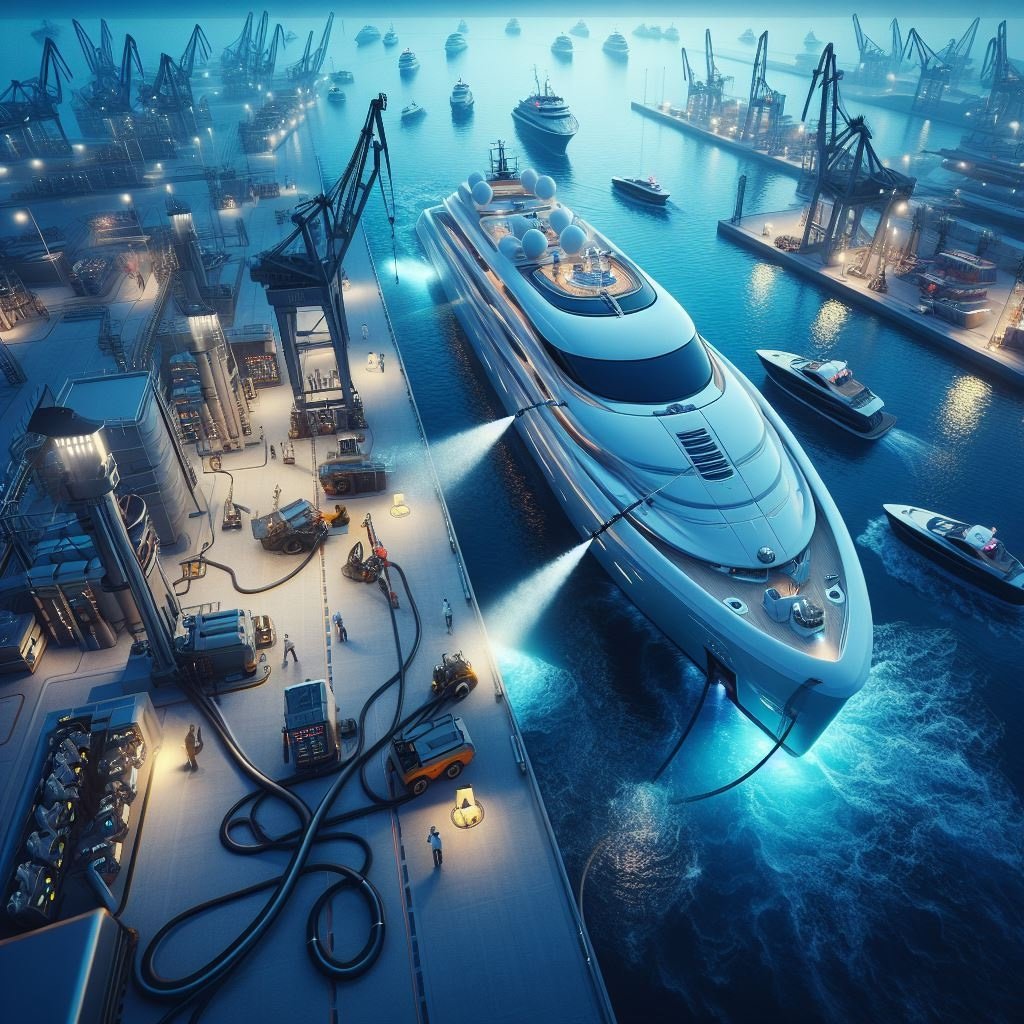
In this article, you will learn about the best practices for refueling your yacht. We will provide you with useful tips and guidelines to ensure a smooth and safe refueling process. By following these practices, you can maintain the efficiency and longevity of your yacht’s fuel system, as well as prevent any potential accidents or damage.
Firstly, it is important to choose a reputable fuel station or marina for refueling your yacht. Look for facilities that have a good track record for maintaining quality fuel and adhering to safety regulations. Before refueling, make sure to turn off all engines and electrical equipment on your yacht to prevent any potential ignition sources. Additionally, always keep a fire extinguisher nearby and ensure that it is in good working condition. When refueling, be mindful of spills and leaks, and take proper precautions to prevent any fuel from entering the water. Finally, properly dispose of any used fuel filters or leftover fuel to minimize environmental impact. By following these best practices, you can ensure a smooth and safe refueling experience for your yacht.
Understanding the Importance of Proper Yacht Refueling
Why proper refueling is crucial for yacht owners
As a yacht owner, ensuring proper refueling is essential for the longevity and performance of your vessel. Proper refueling practices not only guarantee the safe operation of your yacht, but also have a significant impact on its overall performance and efficiency. By understanding and implementing the best practices for refueling, you can ensure a smooth and trouble-free experience while out on the water.
The potential risks of improper refueling
Improper refueling can have dire consequences for both your yacht and yourself. The most immediate risk is the potential for accidents, such as fires or explosions, due to mishandling of fuel. Additionally, using the wrong type of fuel or failing to properly maintain the fuel system can lead to engine damage, decreased performance, and even costly repairs. It is therefore crucial to prioritize proper refueling protocols to mitigate these risks.
The impact of incorrect refueling on the yacht’s performance
Incorrect refueling can have a direct impact on your yacht’s performance. Using the wrong type of fuel can result in poor engine performance, reduced fuel efficiency, and increased emissions. Moreover, using fuel that is contaminated or degraded can cause damage to the fuel system and reduce the overall lifespan of the engine. By following proper refueling practices, you can maintain optimal performance and extend the life of your yacht.
Preparing for Refueling
Checking fuel levels and range
Before embarking on any journey, it is crucial to check the fuel levels on your yacht. Knowing how much fuel you have onboard will help you plan your refueling stops accordingly. Additionally, estimating the range of your yacht – the distance it can travel on a full tank of fuel – will allow you to identify suitable refueling points along your route.
Gathering information about refueling points
Researching refueling points ahead of time is essential to ensure a smooth refueling process. Identify marinas, fuel docks, or other refueling facilities along your intended route and gather information about their opening hours, availability of specific fuel types, and any other relevant information that may affect your refueling plans. This will help you avoid any surprises and allow for more efficient refueling stops.
Reviewing safety procedures and equipment for refueling
Safety should always be a top priority when refueling your yacht. Before setting sail, review the safety procedures and equipment necessary for the refueling process. This includes ensuring the availability and appropriate placement of fire extinguishers, inspecting the condition of fuel hoses and nozzles, and familiarizing yourself with emergency shutdown procedures. By being prepared, you can minimize the risk of accidents and ensure a safe refueling experience.https://www.youtube.com/embed/P1Wx2H10e7c
Choosing the Right Fuel
Understanding different types of marine fuels
There are different types of marine fuels available, each with its own unique properties. The most common fuels used in yachts are gasoline and diesel. Gasoline is often preferred for smaller vessels, while diesel is the preferred choice for larger yachts due to its higher energy density and better fuel efficiency. Familiarize yourself with the characteristics of each fuel type and ensure you choose the one that is recommended for your yacht’s engine.
Considering the yacht’s engine specifications
Every yacht is equipped with an engine that has specific fuel requirements. It is crucial to understand and adhere to these specifications when refueling. Refer to your yacht’s owner’s manual or consult with a qualified technician to determine the appropriate fuel grade, octane rating, or cetane number recommended by the engine manufacturer. Using the correct fuel type will optimize engine performance and prevent potential damage.
Evaluating environmental factors when selecting fuel
When selecting fuel, it is important to consider the environmental impact of your choice. Some fuels have a lower carbon footprint or reduced emission levels compared to others. If environmental responsibility is a priority for you, consider choosing alternative fuels, such as biofuels, that have a lower environmental impact. By making informed choices, you contribute to the preservation of our oceans and marine ecosystems.
Identifying Reliable Fuel Suppliers
Researching reputable fuel suppliers
Finding a reliable fuel supplier is crucial for ensuring the quality and integrity of the fuel you purchase. Research different fuel suppliers in your area, paying attention to their reputation and track record. Look for suppliers that have a long-standing presence in the industry and a history of providing high-quality fuel products.
Verifying their certifications and licenses
To ensure that the fuel supplier meets industry standards and regulations, verify their certifications and licenses. Reputable fuel suppliers should be able to provide evidence of their compliance with relevant safety and environmental regulations. Certifications such as ISO 9001, ISO 14001, or local regulatory certifications demonstrate a commitment to quality assurance and responsible business practices.
Reading reviews and customer experiences
One of the best ways to gauge the reliability of a fuel supplier is by reading reviews and testimonies from other yacht owners or boat captains. Look for testimonials that highlight the supplier’s consistency in delivering clean and reliable fuel. A positive reputation and satisfied customer base are indicators of a trustworthy fuel supplier.
Safe Refueling Procedures
Preparing the yacht for refueling
Before initiating the refueling process, it is important to prepare your yacht. Make sure all flammable materials are safely stowed away, turn off all engines, and close all hatches and doors. Clear the refueling area of any potential hazards and ensure there is adequate ventilation. These precautions will reduce the risk of accidents and create a safer working environment.
Ensuring proper grounding and static dissipation
To prevent electrostatic discharge and minimize the risk of fires or explosions, proper grounding and static dissipation measures must be followed. This involves connecting a grounding wire from your yacht to the fuel dock and ensuring it is securely attached. By dissipating any accumulated static electricity, you greatly reduce the risk of sparks igniting fuel vapors.
Following step-by-step refueling protocols
Every yacht has its own refueling protocols, but there are several general steps to follow during the refueling process. Start by attaching the fuel nozzle securely to the yacht’s fuel intake. Turn off all electrical equipment and ensure no open flames or smoking materials are present. Begin fueling at a slow pace to avoid overflowing or splashing. Regularly monitor the fuel levels and stop refueling once your desired amount is reached. Finally, detach the nozzle carefully and securely store it away.
Minimizing Environmental Impact
Understanding eco-friendly refueling practices
As responsible yacht owners, it is essential to minimize the environmental impact of refueling. Adopting eco-friendly refueling practices can significantly reduce pollution and protect marine ecosystems. These include measures such as avoiding overfilling fuel tanks, controlling spills, and using fuel-absorbent materials to clean up any accidental spills.
Using spill containment systems
Spill containment systems are vital tools in preventing fuel spills and their subsequent environmental damage. Investing in effective spill containment systems, such as absorbent booms or spill kits, ensures that any fuel spills are quickly contained and cleaned up. These systems are particularly important when refueling in sensitive areas such as marinas or near wildlife habitats.
Proper disposal of refueling-related waste
Proper disposal of refueling-related waste is crucial to prevent contamination and environmental harm. Fuel and oil residue, used fuel filters, and other waste generated during the refueling process should be collected and disposed of in accordance with local regulations and best practices. By responsibly managing and disposing of waste, you can minimize your yacht’s impact on the environment.
Monitoring Fuel Quality
Regular fuel quality testing and analysis
Regular fuel quality testing and analysis is essential for maintaining the performance and reliability of your yacht’s engine. Fuel samples should be taken periodically and sent for analysis to reputable laboratories. These tests can reveal any contaminants, water presence, or changes in fuel composition, allowing you to take appropriate corrective actions before any damage occurs.
Signs of fuel contamination or degradation
Monitoring the signs of fuel contamination or degradation is crucial to identifying potential issues. Signs of fuel degradation may include a foul odor, darkening of the fuel, or the presence of sediments. Similarly, contaminated fuel may cause engine misfires, reduced power, or decreased fuel efficiency. Prompt identification of these signs allows for early intervention and prevention of further damage.
Implementing preventive measures
To minimize the risk of fuel contamination or degradation, implementing preventive measures is essential. These include using quality fuel filters to remove impurities, maintaining clean fuel tanks, and regularly inspecting fuel lines and connections for any signs of damage or leaks. By proactively addressing potential issues, you can ensure that your yacht’s fuel system remains in optimal condition.
Maintaining Fuel System and Equipment
Regular inspections and maintenance
Regular inspections and maintenance of your yacht’s fuel system and equipment is crucial for trouble-free refueling. Conduct routine visual inspections of fuel tanks, hoses, nozzles, and other components to check for any wear or damage. Replace any worn-out parts and ensure that all fittings and connections are secure. By addressing minor issues early on, you can prevent more significant problems in the future.
Cleaning and servicing fuel tanks and filters
Cleaning and servicing fuel tanks and filters are key maintenance tasks that should be performed regularly. Fuel tanks can accumulate sludge, water, and contaminants over time, so it is essential to clean them periodically to prevent fuel system issues. Additionally, fuel filters should be replaced according to the manufacturer’s recommendations to ensure proper filtration and fuel quality.
Monitoring fuel system performance
Regularly monitoring your yacht’s fuel system performance can help you identify any potential issues before they escalate. Keep track of fuel consumption rates, engine performance, and any unusual sounds or vibrations that may indicate fuel system problems. By promptly addressing any abnormalities, you can avoid expensive repairs and maintain optimal performance.
Training for Yacht Owners and Crew
Providing proper refueling training
Proper refueling training is essential for yacht owners and crew members to ensure a safe and efficient refueling process. Familiarize yourself and your crew with the refueling protocols specific to your yacht, including safety measures, emergency procedures, and proper handling of fuel and equipment. Consider investing in professional refueling training to ensure a thorough understanding of best practices.
Educating on safety protocols and emergency procedures
In addition to refueling-specific training, educating your crew on safety protocols and emergency procedures is crucial for overall safety on board. Make sure everyone knows how to respond effectively in case of a fuel spill, fire, or other emergency situations. Regular drills and reminders can help ensure that the entire crew is prepared and capable of handling any unforeseen incidents.
Promoting a culture of safety and responsibility
Fostering a culture of safety and responsibility among your yacht’s crew is essential for maintaining best practices in refueling and other operations. Encourage open communication about safety concerns and provide opportunities for crew members to voice their ideas and suggestions. By prioritizing safety and instilling a sense of responsibility, you can create a safer and more efficient working environment.
Conclusion
In conclusion, following best practices for refueling your yacht is of paramount importance. By prioritizing proper refueling protocols, choosing the right fuel, identifying reliable suppliers, and adopting environmentally friendly practices, you can ensure a safe and efficient refueling process. Implementing preventive measures, regularly monitoring fuel quality, and maintaining fuel system and equipment will help prolong the lifespan of your yacht and optimize its performance. Lastly, investing in proper training and promoting a culture of safety and responsibility will further enhance the overall experience of refueling your yacht. By adhering to these best practices, you can enjoy worry-free voyages while minimizing your impact on the environment.
RELATED POSTS
View all


